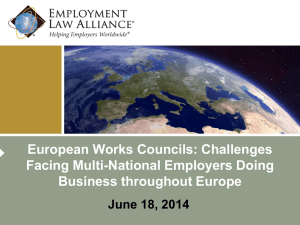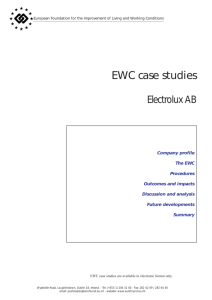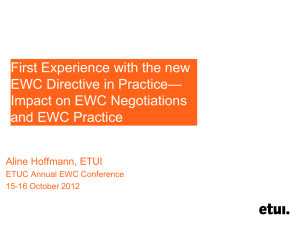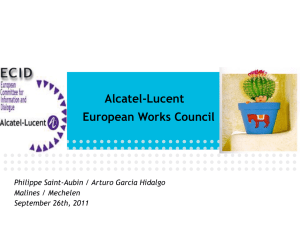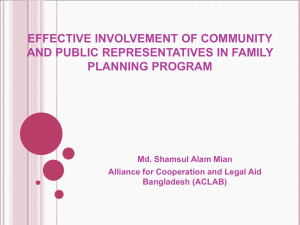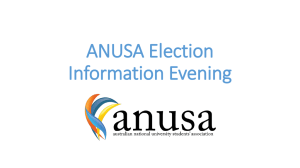EWC-toiminta - TJS Opintokeskus
advertisement
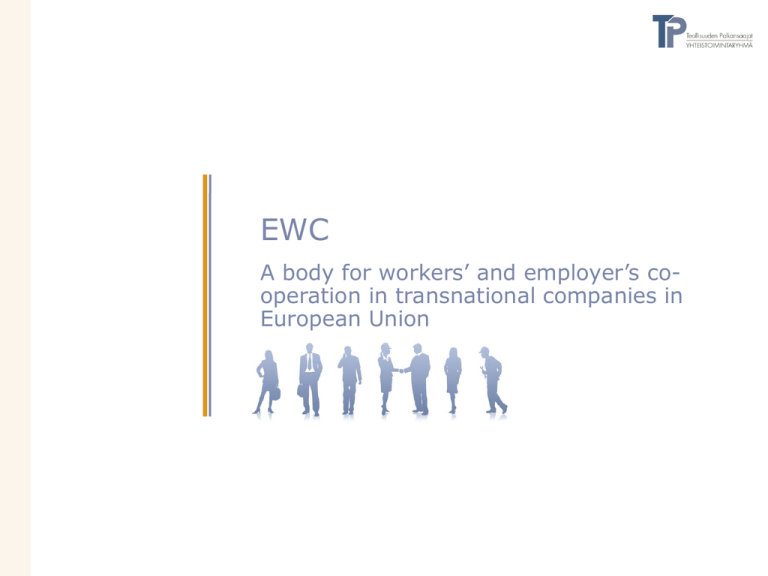
EWC A body for workers’ and employer’s cooperation in transnational companies in European Union What does EWC stand for? • EWC stands for: European Works Council. What is EWC? • EWC is an official platform where the employer of a transnational European company and it’s workers’ representatives can sit down to work together and discuss important issues about their work and the company. • Companies may choose to name this platform other than EWC. Is EWC mandatory? • According to the 2009/38/EC directives, EWC’s formation is mandatory when a company has at least 100 workers in an EU/ETA-country and 150 workers in at least two EU/ETA-countries. • Corresponding law in Finland is the Act on Cooperation within Undertakings (334/2007). The law is based on the older directive from the year 1994. The new directive will be implemented into the Finnish Law by early June 2011. Why EWC? • EWC is a possibility for the staff representatives to learn about their company and discuss its future. • In EWCs representatives are able to compare how the laws and agreements solve work related issues in other countries. How does EWC work? • Some EWC’s exists only on paper. In other words, the company has not understood how to benefit from the EWC. • Some EWC’s work very well. In these EWC’s, workers are able to influence and participate in their company’s decision making and everyone benefits from the dialogue. Here’s how it works: Imagine there is a Company Ltd Company Ltd has manufacturing plants in three different countries and marketing organizations in yet another three. 2 000 employees 800 employees 1 000 employees 100 employees 50 employees 150 employees The company has signed an EWC agreement. That is to say the agreement on ”Group Company Co-operation”. In this agreement the total number of EWC representatives the workers have and the number of representatives allocated to each country is stated . 2 000 employees 100 employees EWC 800 employees 1 000 employees 50 employees 150 employees EWC agreement • Each company has its own individual EWC agreement. • The agreement stipulates how to participate in the council, who represents whom, how the communication is to be carried out and many other details. • The terms of the agreement vary according to the laws of the nationality of the corporation. Nationality is determined by the location of the headquarter. The company is usually represented by either the managing director or the personnel director or both. Managing Director knows what business plans there are. Personnel Director knows what the policy in the company’s work agreements is. Company Managing Director Personnel Director Employees EWC In Finland employees are represented by an elected employees’ representative. In some countries a union officer may represent the employees. In countries where organization rates are low workers must learn how to elect a representative. The first election is always the most difficult one. It helps if good practices are shared among representatives form different countries. Company Managing Director Personnel Director Employees EWC In EWC meetings, representatives can discuss for e.g. what business plans the company has. Company Managing Director Personnel Director Employees EWC Our production line B is no longer profitable. We intend to sell it away. Instead we want to buy company N which will give us a new production line H. Managing Director EWC Personnel Director Company Employees This would mean a personnel reduction of 600 employees in our Finnish plant and closing down our Estonian sales organization. The new company which we intend to buy, will probably be situated in Belgium and add 400 new employees. Managing Director EWC Personnel Director Company Employees Our most profitable products are customized products manufactured in Production lines A and C. The tools and know-how needed for these commissions are provided by the employees from Production line B. If we were to sell off Production line B, we would also lose our strategic know-how. Managing Director EWC Personnel Director Company Employees Now, this is something to think about. According to our customer survey, quality is the key to our success. Fortunately we presented this plan first to you and not the Board. We need to think about this more. Managing Director EWC Personnel Director Company Employees How does EWC benefit the company? Company Employees Employees have intimate knowledge on what actually happens at work. By listening to them, management gets information it wouldn’t get from anywhere else. Managing Director Experience has proven, that when employees can influence their work, they will be more motivated and committed. Through the EWC, the employer can also benefit from the representatives’ knowledge of the laws, agreements and customs in different countries. EWC Personnel Director How does EWC benefit the workers? Company Employees •Employees get to be heard and get an opportunity for equal treatment even when decisions concerning their work are made in an other country. Managing Director Personnel Director EWC •Dialogue between representatives from different countries help employees understand their company and communication cultures in different countries. How does EWC benefit the employees’ representative? Company Employees •Representatives get information and an opportunity to influence the decisionmaking Managing Director EWC •Representatives learn to understand how employers think. •They learn languages and gain presentation skills. Personnel Director •Experience from working with representatives of different countries broadens one’s mind. It is a good way to learn more about union practices and collective bargaining. How does EWC benefit a union? Company Workers Association Trade Union EWC Managing Director Personnel Director •In transnational companies employees are hired and fired and collective bargaining tried out. Best practices tend to set a model. This model may in time become basis of an EU directive and after that get to be implemented in work laws of all member states. EWC representatives are the forerunners, who have the opportunity to influence these practices when they are just beginning to form. How does EWC work in practice? Company Managing Director Personnel Director Employees EWCmeeting Company agrees on an ”international cooperation within Group companies” – agreement, which stipulates for e.g. how often the EWC-representatives meet. The agreement stipulates also other important meeting practices, such as who can propose items on the agenda, time schedule of such proposals, whether it is mandatory for each country to have a representative, is there a deputy system… The 2009/38/EC Directives provides guidance on the minimum number of delegates in a meeting and directs that the EWC should meet at least once a year. There are few limitations on the quantity of delegates and the number of meetings as long as the minimum requirements are met. The employee representatives must always be given the opportunity to have their own meeting before and after EWC-meetings. Company Employees Managing Director Personnel Director EWCmeeting For effective interaction, one or two meetings a year are not enough. In business life, plans and decisions are being made all the time. What the EU directive aims at, is that employees should have an opportunity to influence. This aim will not be fulfilled if corporate decisions are only made known to employees afterwards. Therefore annual EWC-meetings are supplemented by working committees. They consist of fewer people and can be summoned easily. It is also possible to form other work groups to take a stand on upcoming matters. Company Employees Work committee Managing Director Personnel training work group Annual EWC- meeting Strategy work group Personnel Director R&D work group Employees receive information about decisions and their rationales through their own representatives. Through representatives a genuine dialogue and possibility to influence is made available to all employees. € m o a € m k o a §s l s k § l Personnel training work group Work Committee m € o a k l s o € m a k § R&D work group l Strategy work group §s Employees receive information about decisions and their rationales through their own representatives. Through representatives a genuine dialogue and possibility to influence is made available to all employees. a §m y € t h Work committee Personnel training work group t §m y € a h a h §m y € t t h §m y € a Strategy work group R&D work group §m y € h a t How to start EWC in a company? When a company becomes a multinational company e.g. , through acquisition, either management or the employee representatives of at least two countries will propose to call a meeting of a Special Negotiation Body (SNB). The body will make the preparations for the starting of the EWC. It is not wise to wait too long for the employer to take initiative. In Europe there are about 2000 companies, where there should, according to the law, be an EWC but only about 850 where one has been established. I propose to call for an SNB meeting. Employee representative Managing Director Special Negotiation Board SNB Personnel Director Employee representative I support the proposal. The SNB shall be represented by at least one representative from each EU member state, where the company operates. The employees get one additional representative for each 25% of employees of the total number of employees in Europe. (This may change with the new law.) An SNBrepresentative represents all groups of employees in his or her country. Management Production Production workers Production workers Managing Director Special Negotiation Board SNB Administration Production Workers Sales Administration Sales Personnel Director Management Sales SNB negotiates the international co-operation of the Group companies. The agreement will form a base for the future co-operation function. When an agreement is achieved, the SNB will be dissolved and its work will be continued by the EWC. The same persons, however, may continue to work in the EWC. Trade unions provide support and expertise in the negotiations. Employee representative Management Production Employee representative Workers Production Employee representative Workers Production Managing Director Personnel Director Special Negotiation Agreement Board SNB Employee representative Administration Production Employee representative Workers Sales Employee representative Administration Sales Employee representative Management Sales What does EWC-agreement cover? Total number of EWCrepresentatives, manner of election, duration of their term Scope of financial resources, how many days, etc. Number of meetings per year, where meetings take place Agreement on Group Company co-operation How long is the agreement valid and when must it be renewed Methods of information and communication Agenda of meetings Language, use of interpreters Group companies’ structure, financial sitution, business and employment Prospects, transfer of production, fusions……. Always consult your national union when negotiating the terms of the agreement. You will benefit from their experience.
